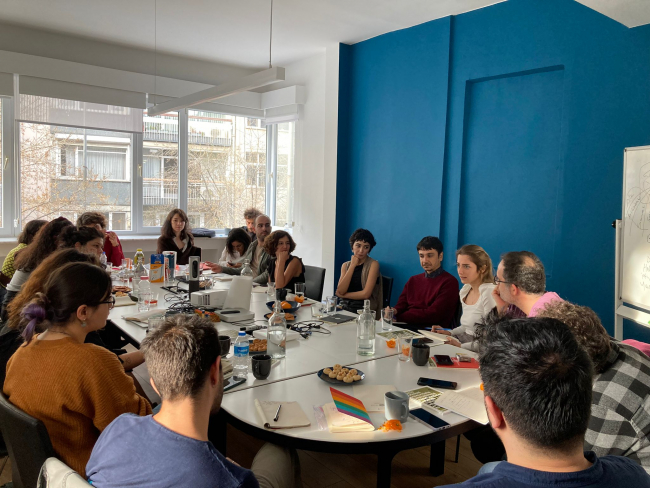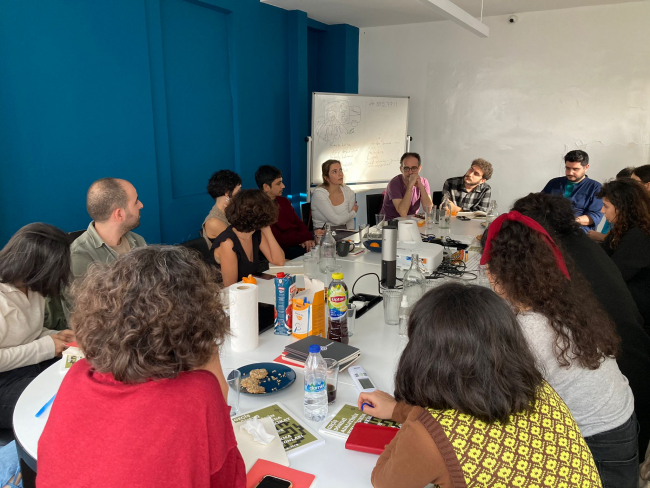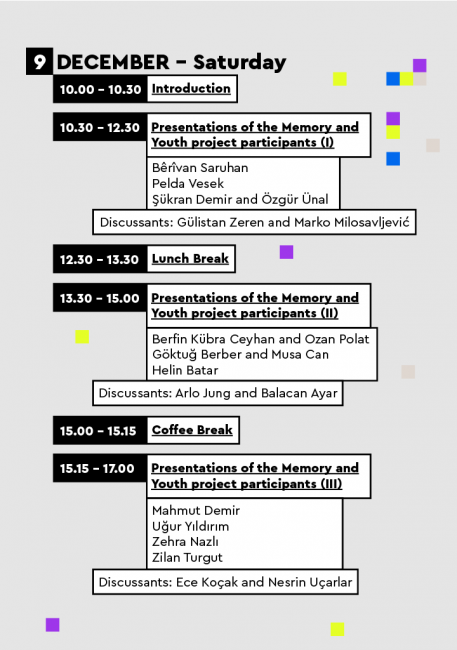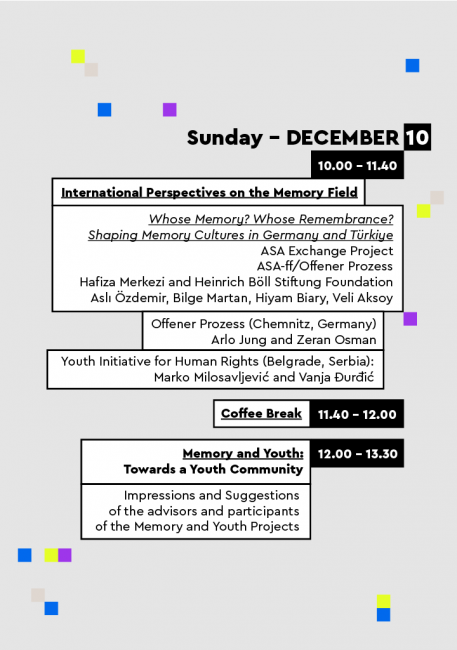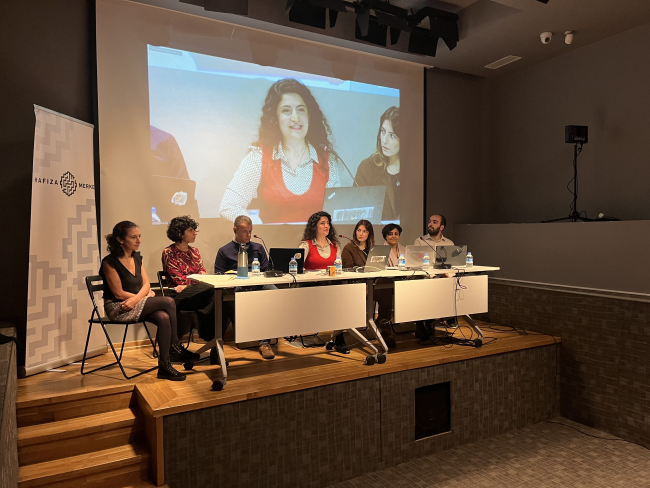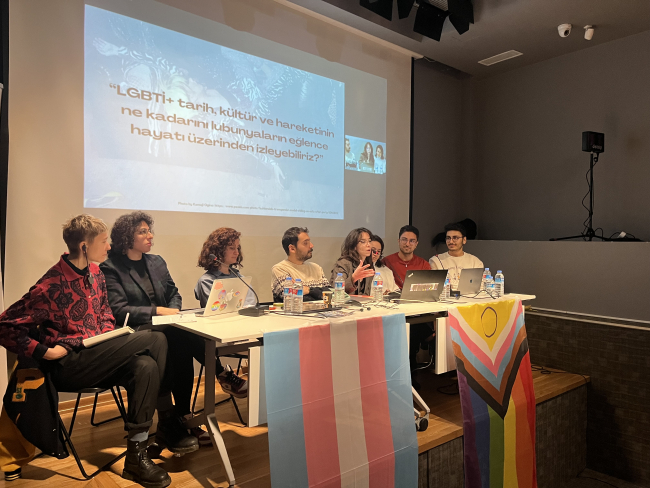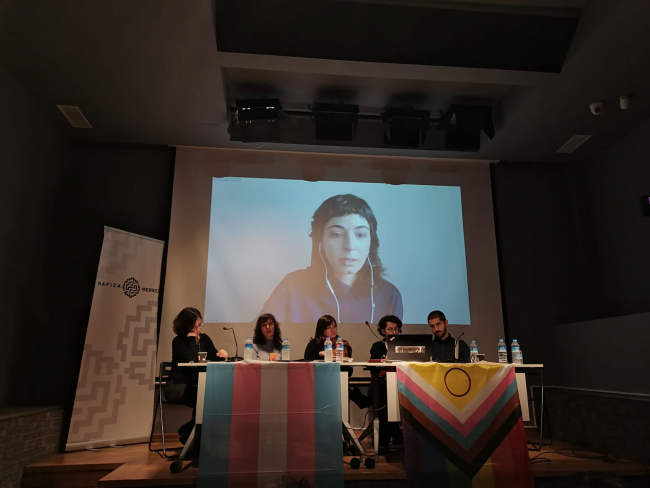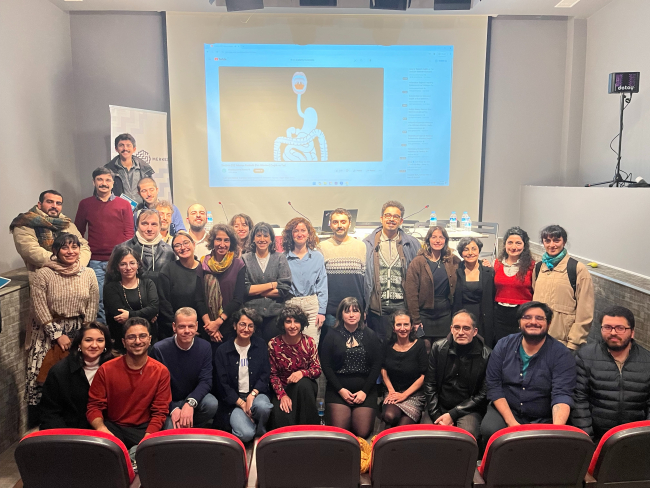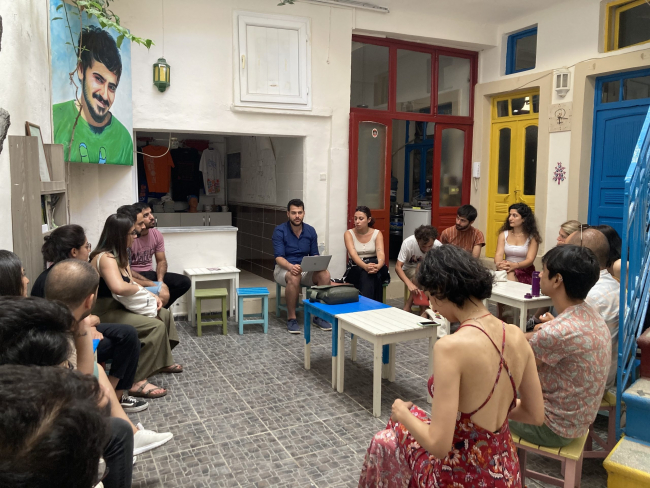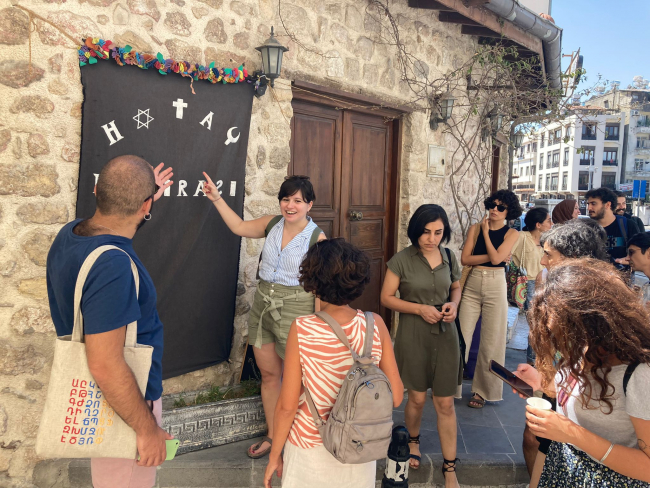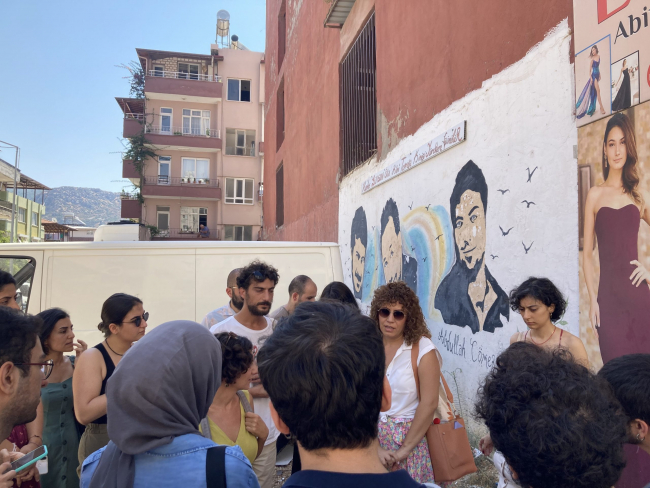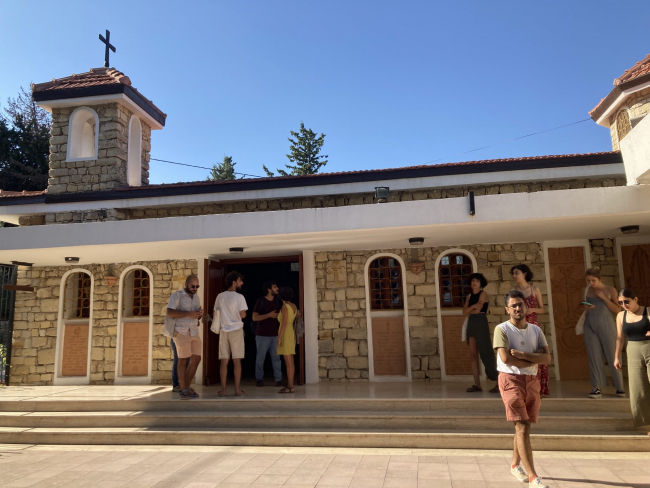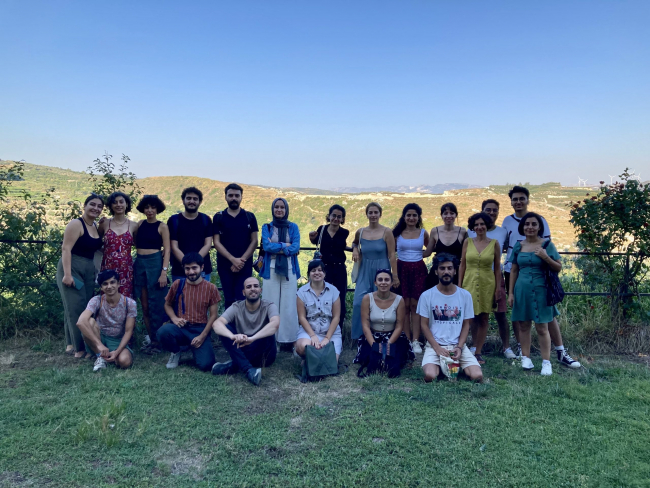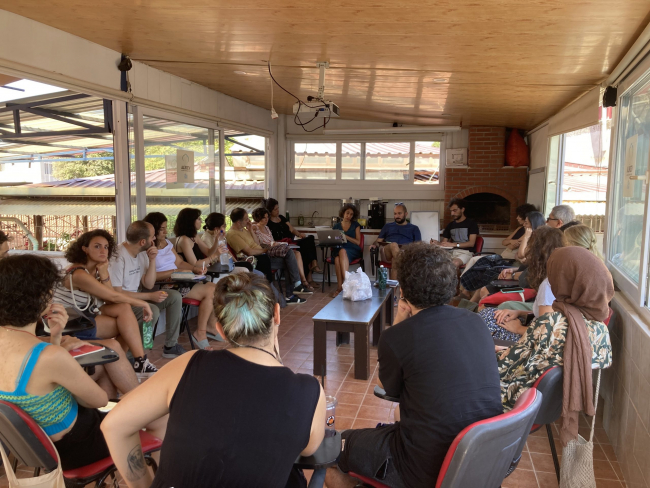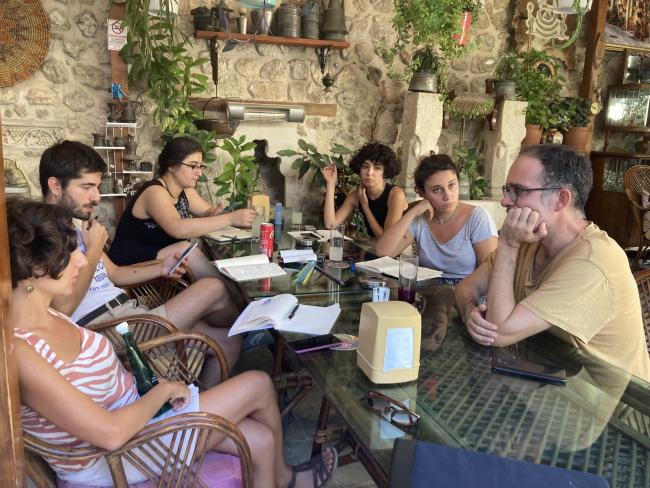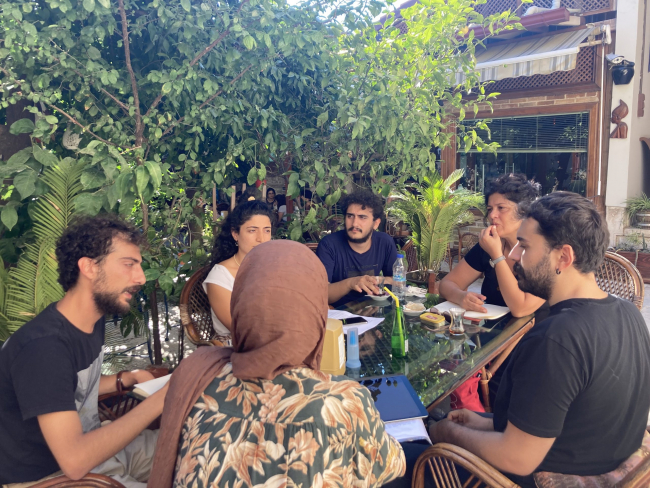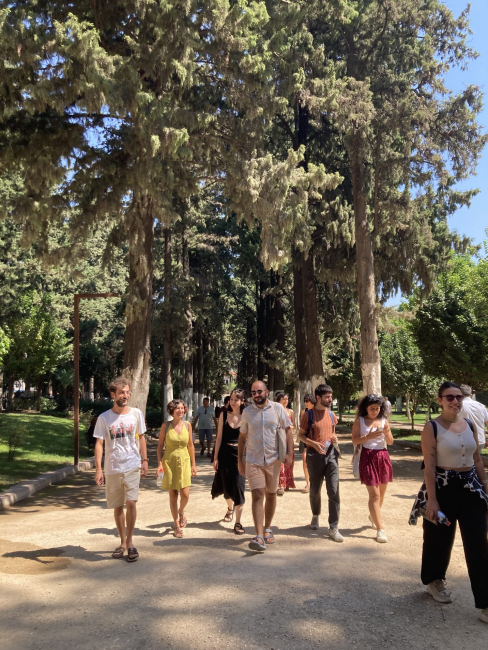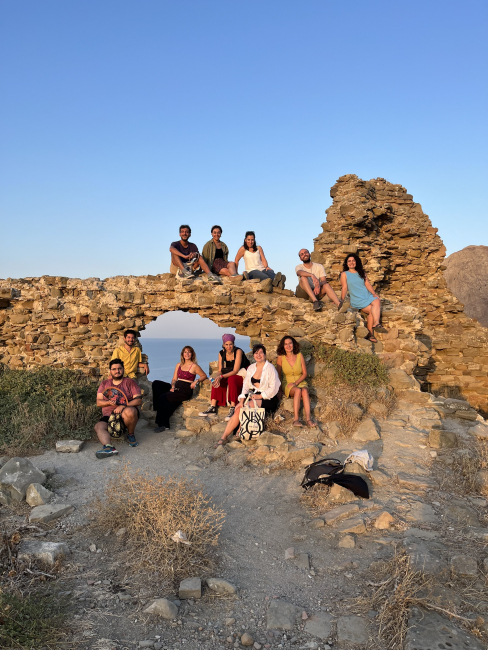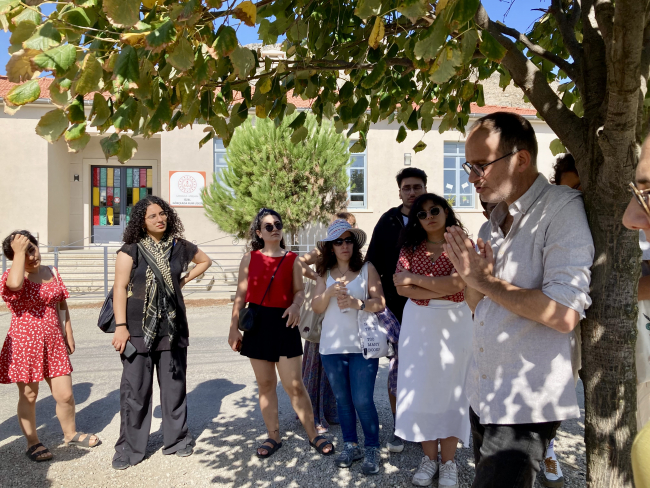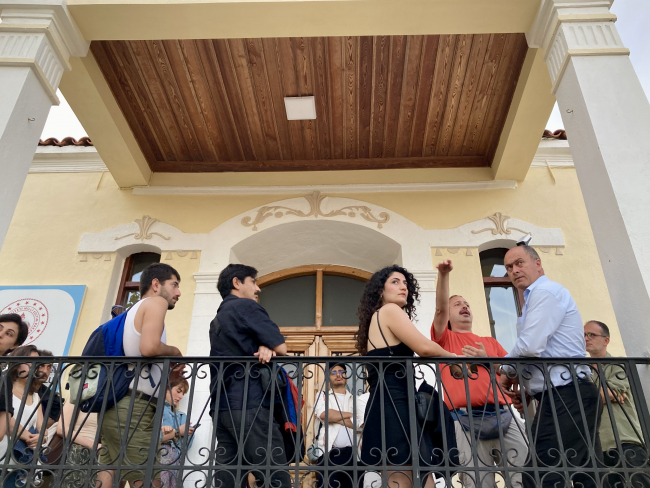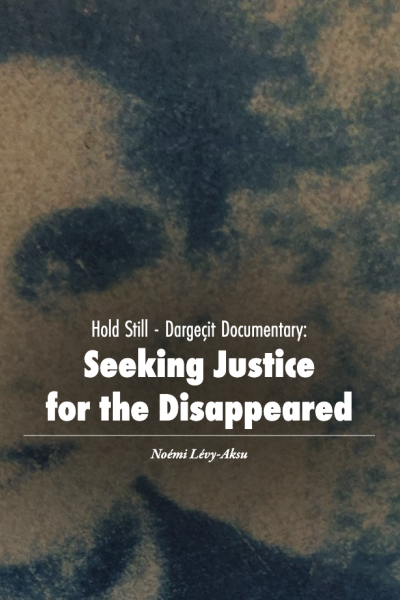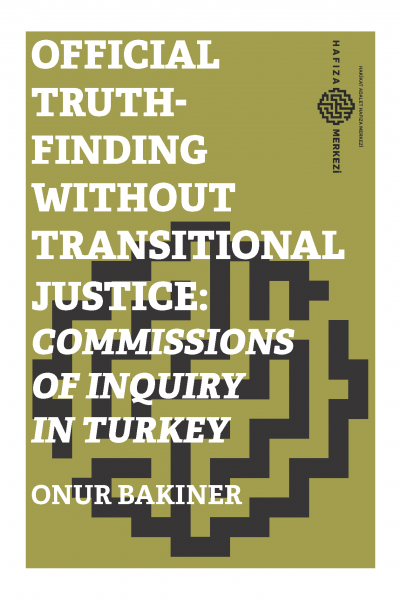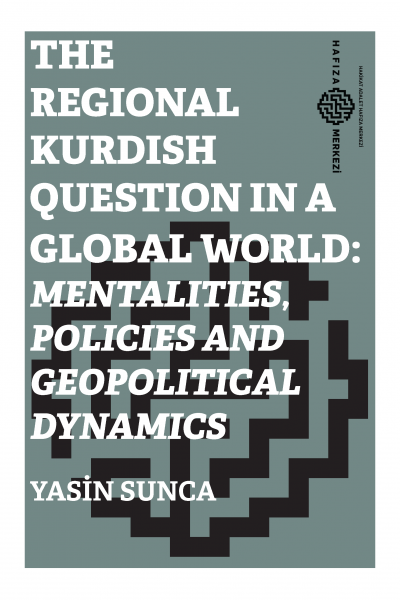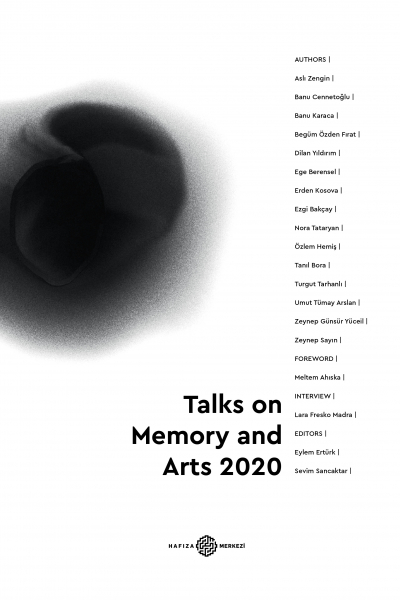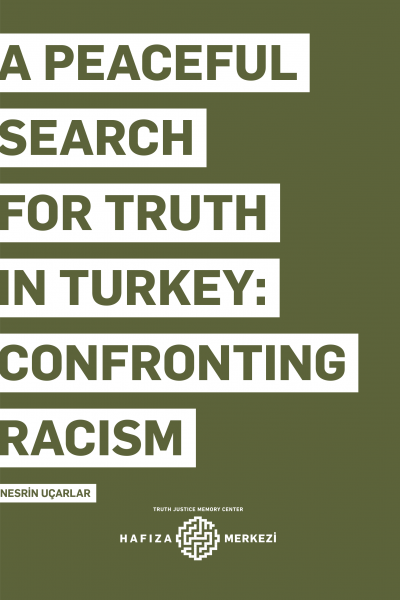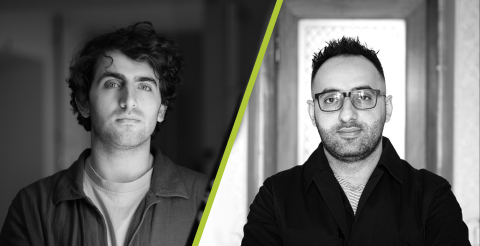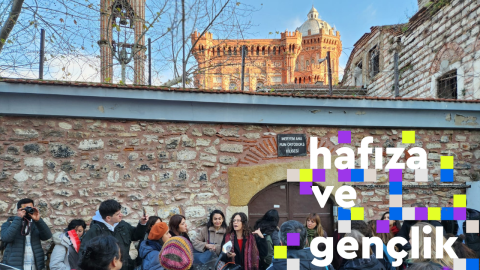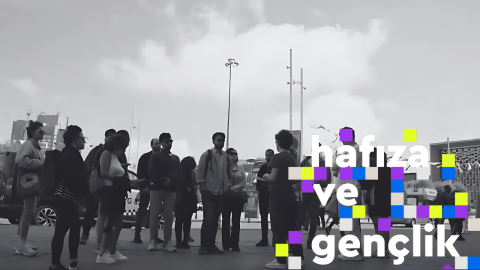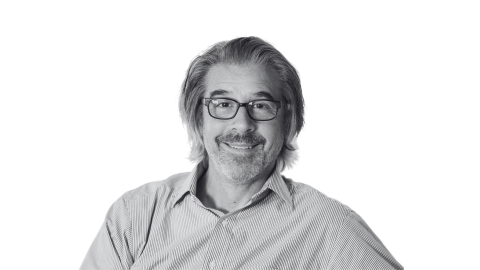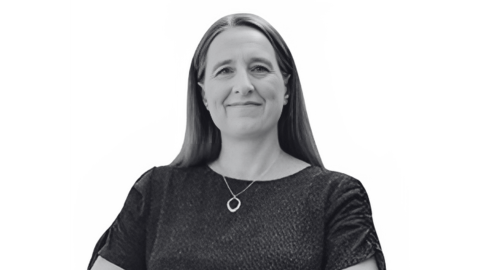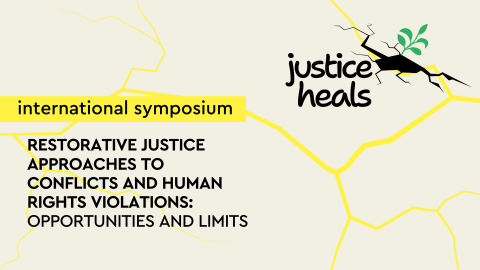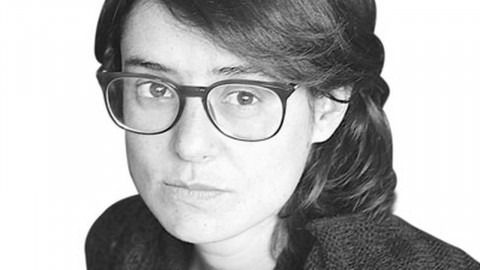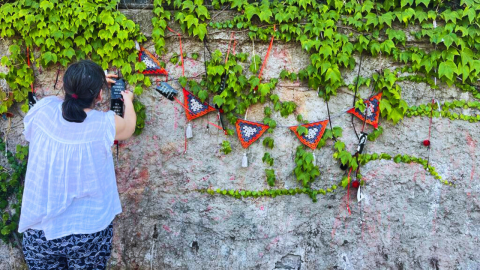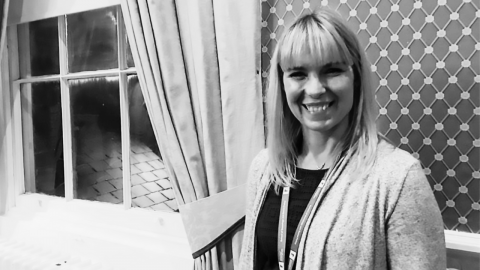Memory and Youth (2022-2023)
Start Date: 01.06.2022
End Date: 31.12.2023
Website: https://hakikatadalethafiza.org/en/project/memory-and-youth-2022-2023
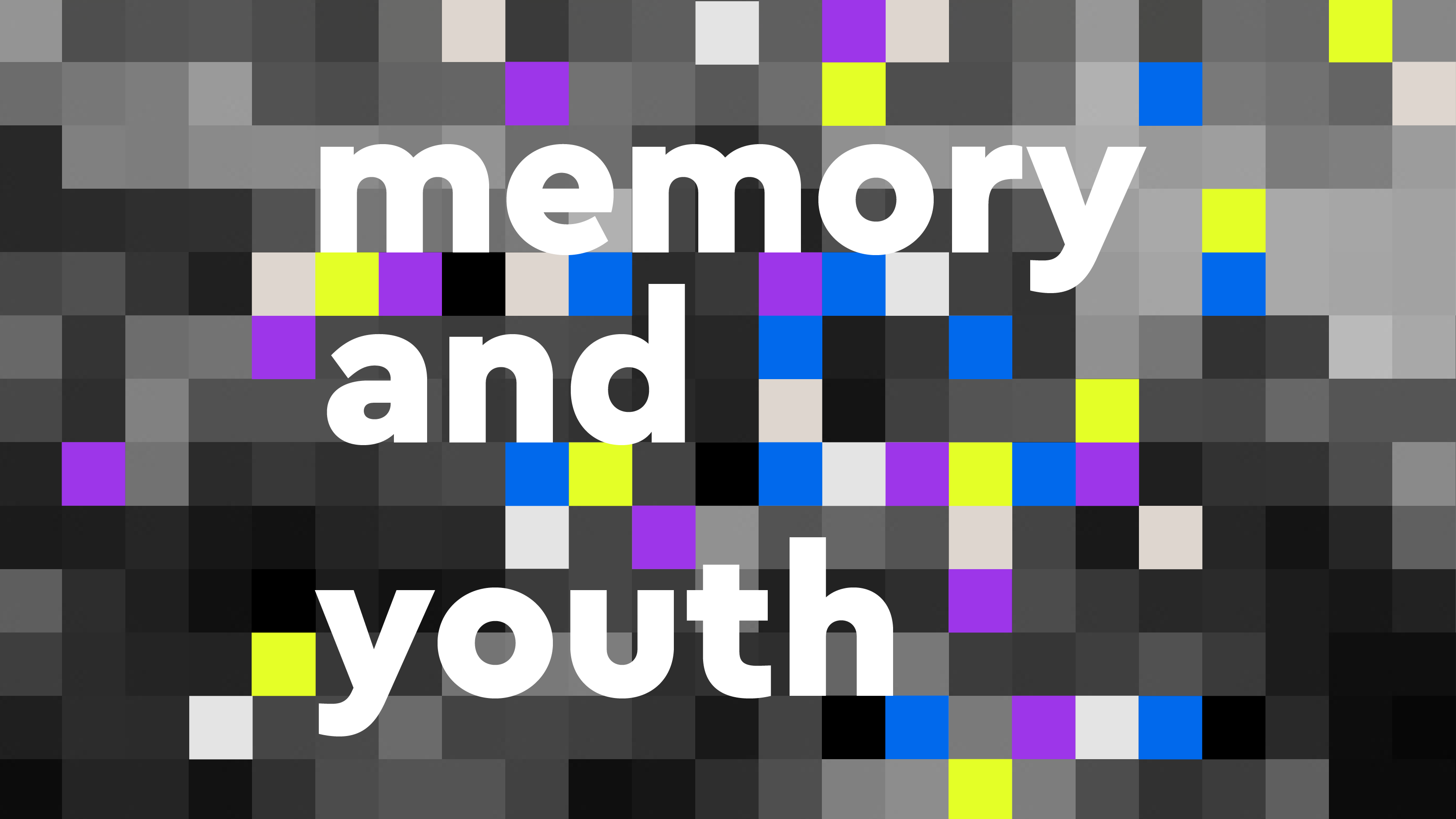
Memory and Youth 2022-2023 is the continuation of the first Memory and Youth project carried out during 2020-21. We aim to engage the young generation in a discussion on memory work and struggles around the world and in Turkey. We put together a workshop program for our 16 project participants, aged 20-30, and support them in realizing their own projects related to collective memory.
Objective
The aim of this project is to introduce young people from different cities across Turkey and from different social backgrounds to the fields of social memory and memory work, to increase their knowledge and interest about these topics, to create a dialogue between the young individuals, who each bring their own experiences, knowledge, and memories with them, and to discuss present struggles by tracing the past. We support the young participants in making original contributions to the field of memorialization by developing their own collective and/or individual projects.
Rationale
This project was carried out in line with Memory Center’s long-term vision to discuss issues related to collective memory, taking into account the interests of young people. Today, the legacy of the past is becoming more and more visible and contentious in Turkey and around the world under many different forms, such as official apologies or petitions, post-colonial studies or the Black Lives Matter movement, the construction of new memory spaces or the demolition of statues. Meanwhile, the practices of Turkish civil society to commemorate, understand, and remember the past largely omit the interests of young people. Our project seeks to find a way of developing an innovative, hope-based and future-oriented language to engage today’s young generation in a dialogue about the heavy traumas of the past. Some of the questions that prompted us to carry out this project were as follows. What kind of history is underlying the violence, hatred, and discrimination that we encounter every day? How do the social traumas experienced by older generations impact the younger generations? How do remembering and forgetting affect our efforts to make sense of the present? What happens when we encounter people with different experiences, and how do we communicate with people whose stories are far from ours? When does the burden of the past create a demand for change? How does who or what has been silenced and suppressed in the collective memory return? In what aspects and how do today’s memory struggles shed light on themes such as racism, pluralism, public space, the right to the city, gender-based inequalities and activism? Can we think of constructing a plural and critical social memory to counter a singular narrative?
Activities
In project design, we place special emphasis on positioning participants not as passive listeners but as active contributors shaping the project. Within this framework, the core activities of the project consist of workshops facilitated by the active participation of young people. In addition to workshops, discussions facilitated by young people with advisory support and the projects they will create are also integral to the project. Furthermore, to enrich the workshop activities, field visits to places related to historical events, monuments, or archives will be organized. We aim for the program, structured within the principles of applied, experiential, and collaborative learning, to be a sustainable and transferable experience by documenting its resources and the learning process.
1. Workshops
In designing the project, we paid special attention to make sure that the participants would not be in the role of passive listeners but act as active contributors who shape the project. Accordingly, the main activities of the project consist of workshops relying on the participants’ active participation and interviews and projects which they carried out with the support of their advisors. In addition to these workshops, we planned field trips to historical places, monuments, and archives. In developing the program, we adopted the principles of applied, experiential and collaborative learning. Our objective is to document the learning process and create a record of all resources to make for a sustainable and transferable experience.
Kick-off meeting – July 2-3, 2022, İstanbul
The young participants and our project advisors physically gathered for the first time in Istanbul for the kick-off meeting held on 2-3 July 2022. It included a presentation by Özgür Sevgi Göral on the transformations of the memory field in the 20th century and a group discussion on the 20th anniversary of Sivas Massacre. In the second part of the workshop, the young participants shared ideas about their respective projects and the first steps to start their implementation. The Hafiza Merkezi team also presented the Memorialize Turkey website and we discussed possible ways for the youth to enrich and transform the contents of the website.
Research Methodology Workshops
We organized a series of workshops on research methodology to equip the participants with useful tools for their projects.
- Adnan Çelik, Fieldwork Methods Workshop – 31 October 2022, Online
- Seda Altuğ and Foti Benlisoy, Research Methods Workshop – 14 November 2022, Online
- Sema Semih, Studying History from a Gender Perspective Workshop – 24 November 2022, Online
- Meryem Yavuz Arık and Ahu Öztürk, Using Video for Memorialization Workshop – 19 December 2022, İstanbul
- Beyza Bilal, Working with Trauma and Secondary Trauma Workshop, 8 April 2023, İstanbul
- Ozan Çağlar and Fatoş Yıldız, Fundamentals of Documentary Filmmaking Workshop, 13-14 April 2023, İstanbul
- Members of the bak.ma collective, Autonomous Archives and Constructing the Counter-Memory Workshop, 8 May 2023, Online
Memory Talks
The Memory Talks are organized on the first Wednesday of each month. They encourage the young participants to actively follow memorialization work and share their knowledge with their peers. Each month, a young participant volunteers to choose the topic of the talk and shares relevant sources on the Padlet page. This participant is free to choose the format of the talk and moderates it.
- Confronting the Past– 12 October 2022, Online
- Respect for the Dead and the Right to Mourn – 2 November 2022, Online
- Counter Monument, Memorialization and Art – 14 December 2022, Online
- How to Make Podcasts? – 4 January 2023, Online
- Sharing Experience: Interviews and Data Collection in the Conflict Zones – 1 February 2023, Online
- Being LGBTI+ in Times of Disaster – 7 March 2023, Online
- Reflecting on the Memory of Social Struggles: Case of the Women’s Movement of Turkey – 7 April 2023, Online
- Language Politics of the Turkish State since the Proclamation of the Republic, the Kurds and the Kurdish language – 3 May 2023, Online
- Collective Memory of Remembering and Forgetting in the Spatial and Temporal Context – 7 June 2023, Online
- Music Memory – 5 July 2023, Online
- Migration, Space and Collective Memory – 2 August 2023, Online
- Rethinking What Antisemitism Is – 6 September 2023, Online
- Spatial Memory of Bomonti – 22 November 2023, Online
- Memorialize Turkey: Media Activism, Social Change and Constructed Reality – 29 November 2023, Online
Follow-up workshops
During the project period, we organized two follow-up workshops and six project progress meetings to follow up on the progress of the participants who carried out their original memorialization projects individually or in groups and to discuss their experiences during the research together. During these workshops, we provided a space where participants could discuss the progress of their projects, give feedback to each other and share their thoughts on how the project should continue.
- Project follow-up workshop – 16 December 2022, İstanbul
- Project follow-up workshop – 28 April 2023, Online
- Series of project progress presentations by participants – 3-10-17-24-31 October, 7 November 2023, Online
After the earthquake: Understandnig the social dynamics of the disaster
After the deadly earthquake which hit Karamanmaraş and its region on February 6th, 2023, we started a series of seminars to discuss the political, social and human dimensions of the workshop.
- Foti Benlisoy, The politics of the catastrophe and “natural disaster” – 22 March 2023, held in person at Hafıza Merkezi office with Zoom connection available
- Mert Koçak, Migration after disasters: Who deserves help? – 28 April 2023, held in person at Hafıza Merkezi office with Zoom connection available
New Memory Fields: Opening Space for the Youth, Strengthening International Dialogue Workshop – 9-10 December 2023, İstanbul
In the framework of this international workshop, participants of the Memory and Youth project presented the results and findings of their individual memorialization research projects, on which they have been working for the past year and a half. On the second day of the workshop, representatives from Offener Prozess, an NGO based in Chemnitz, Germany and Youth Initiative for Human Rights (YIHR) Serbia discussed their respective approaches to memorialization. The participants in of the ASA Exchange Program between Turkey and Germany shared their experiences from the past year and the memory work.
▶ Click here to see the workshop program which includes project summaries of each participant.
2. Interviews and blog posts
Program participants conduct interviews and write essays to enrich the Memorialize Turkey website. We publish their work on Hafıza Merkezi’s Medium account and disseminate them through our social media accounts. Note that these are only available in Turkish or Kurdish:
- Mahmut Demir - Interview with Dicle Anter to enrich the Musa Anter Memorial Sites content: Remembering Apê Musa to oppose the policies of impunity, 20 September 2022.
- Impressions from the Antakya field visit, 8 November 2022.
- Pelda Vesek - Interview with Besna Tosun to enrich the Saturday Mothers/People content: On one hand sadness, on the other an upstanding life, 2 December 2022.
- Musa Can Durmaz - Feminist Storytelling: Transcending Borders, 9 January 2023.
- Zilan Turgut - Interview with artist Meltem Şahin to enrich theThe Monument Counter: A Digital Memorial for Women Killed by Male Violence content: “One’s pain does not pass to another”: An effort not to forget and to be heard, 26 January 2023.
- Zilan Turgut - Interview with Ömer Çakır, conducted as part of her research project: An Unheard Scream from Kürkçüler to Pozantı: “If God is omniscient, why does He ignore us?”, 21 July 2023.
- Bêrîvan Saruhan’s Belgrade field visit impressions: Kî Berê Gula Zerê, 18 August 2023.
- Hafıza Merkezi Project Coordinator Merve Bakdur’s Imbros field visit impressions: Bağlarıyla İmroz, 31 October 2023.
- Bilge Martan’s Imbros field visit impressions: Bir Ladolia Tanıklığında İmroz, 2 November 2023.
- Uğur Yıldırım’s Imbros field visit impressions: Türklük Sözleşmesi sınırında bir ada: İmroz, 6 November 2023.
- Özgür Ünal and Şükran Demir’s Imbros field visit impressions: İmroz: Bir Zamanlar Geri Dönüleceği İnancıyla Kapılarına Kilit Vurulan Ada, 20 November 2023.
- Zehra Nazlı’s essay that accompanies the Ulucanlar Prison Museum content: The transformation of violence from museum to prison: Restoring memory, 30 November 2023.
3. Transforming the Memorialize Turkey web site
Memorialize Turkey highlights examples of memorialization related to the many groups and individuals who have suffered harm or rights violations over the past 100 years in the late Ottoman Empire and the Republic of Turkey. The website does not seek to address all the works and stakeholders of the memory field. It rather aims to start a dialogue on the different formats, scopes, functions of memorialization works.
The website was first launched in 2013 and regularly updated to follow the transformations of the memory field. In the framework of our Memory and Youth project, we aim to work together with the participants on an updated and redesigned version of the website. This will give them an opportunity to learn about the different memorialization projects and to become themselves actors of this field. The participants have started to conduct research and enrich the website through different contributions (interviews, literature reviews, multimedia files).
4. Projects
The participants will work on individual or small group projects. The outputs, such as essays, reports, interactive maps, videos and e-books, will give to the participants the opportunity to put into practice methods and theories discussed during the workshops and to position themselves as active subjects.
5. Field visits
Antakya field visit - September 8-11, 2022
On September 8th-11th, 2022, we organized a field visit to Antakya with 16 participants and the project advisors. We visited the Ali Ismail Korkmaz Foundation, had a memory tour in the Armutlu neighborhood with the Zengiler Atölyesi initiative and went to the Armenian village Vakıflı Köy and the Museum of the village. Dr. Seda Altuğ made a presentation about the transformation of Hatay in the 20th century.
▶ Click here to see the field visit itinerary in Turkish.
Belgrade field visit - June 21-23, 2023
YIHR Serbia and Hafıza Merkezi organized a three-day field visit and workshop titled Perspectives on Memorialization in Turkey and the Western Balkan in Belgrade on June 21-23, 2023. The workshop was a unique opportunity for 15 memory activists from Turkey and five young memory activists from Serbia to exchange knowledge and learn from activist experience to become better acquainted with the memorialization process and the culture of commemoration of war and war crimes in Serbia and Turkey. On the first day, with Nikola Radić from the Center for Holocaust Research and Education, participants had a chance to visit and discuss in detail the social use and misuse of a few monuments in Belgrade. Jelena Jovanovic, a researcher from Humanitarian Law Center from Belgrade (HLC), presented to the participants memory-related digital monuments that HLC has done in the last couple of years, such as the Kosovo Memory Book, Batajnica Memorial Initiative and the Voice of Victims website. At the end of the workshop, the participants had a public talk with Marko Milosavljevic from YIHR Serbia about secret mass graves in Serbia. The public discussion was held before the entrance to the training center of the Special Anti-Terrorist Unit of the Serbian Police, where the remains of 744 Albanian victims were found.
▶ Click here to see the field visit itinerary in English.
Imbros field visit - September 13-16, 2023
We organized a field trip to the Aegean island Imbros (Gökçeada in Turkish) on September 13-16, 2023. We participated in the yearly opening ceremony of the Greek schools of the island in Zeytinliköy and we discussed the past and present of the Greek community of Imbros with the school director and musician Stelyo Berber. We visited the Greek villages and the ruins of the once operating open prison on the island. We also learned about the complex history of Greece and Turkey starting from the 19th century, the population exchange of 1923 and other conflicts the two states faced throughout the 20th century, as well as how these political developments have affected Imbros from our project advisor Foti Benlisoy.
▶ Click here to see the field visit itinerary in Turkish.
